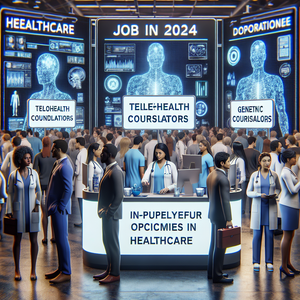
Navigating the 2024 Healthcare Job Market: In-Demand Roles and Exciting Opportunities
As we look ahead to 2024, the healthcare job market emerges as a beacon of growth and opportunity, largely unaffected by broader economic fluctuations. This robust demand is fueled by an aging population, advancements in medical technology, and the enduring impact of the pandemic. Healthcare professions promise not only job stability but also competitive wages and comprehensive benefits, making them attractive career choices even in uncertain times. However, challenges such as high turnover and burnout persist. To combat these, the industry is quick to hire and offers enticing incentives like housing support and student loan aid. Embracing modern hiring technologies and flexible work options, healthcare organizations are enhancing recruitment and retention. Educational pathways are also evolving to meet the sector's changing demands. With a competitive job market and numerous vacancies, healthcare is ripe with opportunities for those seeking a stable and fulfilling career. In the sections below, we delve into high-demand roles, exploring their responsibilities and qualifications, and invite readers to consider these dynamic career paths.
Job Summaries:
Registered Nurse (RN):
- Registered Nurses are the backbone of patient care, offering direct support in various healthcare settings.
- They assess patient conditions, administer medication, and collaborate on care plans.
- Typically, a Bachelor of Science in Nursing (BSN) or an Associate Degree in Nursing (ADN) is required, along with passing the NCLEX-RN exam.
- With healthcare services on the rise, RNs are more crucial than ever.
- Dive into current RN opportunities and join this essential workforce.
Medical Assistant:
- Medical Assistants are key players in healthcare facilities, balancing clinical and administrative tasks.
- They assist with patient exams, maintain records, and coordinate appointments.
- A certificate or diploma from an accredited program is generally necessary, and certification can boost job prospects.
- Their adaptability makes them highly sought after, streamlining operations and enhancing care efficiency.
- Explore the latest Medical Assistant openings to make a meaningful impact in healthcare.
Healthcare Administrator:
- Administrators ensure seamless facility operations, managing budgets, staffing, and policy compliance.
- A bachelor's degree in healthcare administration or a related field is required, with a master's preferred for advanced roles.
- Administrators are pivotal in navigating industry challenges and regulatory shifts.
- Discover opportunities to lead and innovate in healthcare administration.
Physician Assistant (PA):
- Working closely with physicians, PAs provide diagnostic and therapeutic services.
- They conduct exams, diagnose illnesses, and assist in surgeries.
- Certification from the National Commission on Certification of Physician Assistants (NCCPA) is needed after completing an accredited program.
- Amidst a physician shortage, PAs are vital in bridging care gaps.
- Explore PA roles and enter this rapidly expanding profession.
Nurse Practitioner (NP):
- NPs are advanced practice nurses delivering comprehensive care, from diagnosing to treating illnesses.
- Often focusing on specific populations like family or geriatric care, NPs require a master's or doctoral degree in nursing and state licensure.
- They are pivotal in preventive care and managing chronic diseases.
- Check out NP roles to advance your career and broaden healthcare access.
Pharmacist:
- Pharmacists dispense medications
- Offer drug counseling
- Ensure medication safety
- Hold a Doctor of Pharmacy (Pharm.D.) degree and state licensure
- Essential in patient education
- Collaborate with healthcare providers
- Optimize patient outcomes as medication therapies grow complex
- Explore Pharmacist positions to contribute expertise to patient care
Radiologic Technologist:
- Radiologic Technologists perform diagnostic imaging exams like X-rays and MRIs.
- An associate degree and certification by the American Registry of Radiologic Technologists (ARRT) are typically required.
- With technological advancements, their role is increasingly vital.
- Discover opportunities in this cutting-edge field.
Occupational Therapist (OT):
- OTs help patients develop skills needed for daily living and work.
- They create personalized plans and collaborate with caregivers.
- A master's degree in occupational therapy and state licensure are required.
- As rehabilitation gains emphasis, OTs are crucial to patient recovery.
- Explore OT positions to make a positive impact on patient lives.
Physical Therapist (PT):
- PTs help patients improve mobility, manage pain, and prevent disability.
- A Doctor of Physical Therapy (DPT) degree and state licensure are necessary.
- With a focus on physical health and rehabilitation, PTs are in high demand.
- Check out PT roles to help patients achieve better outcomes.
Licensed Practical Nurse (LPN):
- LPNs provide basic nursing care under RN and doctor supervision.
- Their tasks include monitoring health and assisting with daily activities.
- LPNs must complete a state-approved program and obtain licensure.
- As facilities strive to meet patient needs, LPNs are integral to the nursing team.
- Discover LPN opportunities to contribute to patient care.
These summaries underscore the diverse and high-demand opportunities within the healthcare sector, encouraging readers to explore and find their niche in this ever-evolving field. By weaving in data-driven insights and expert perspectives, this article aims to provide a comprehensive overview of the current healthcare job market, guiding readers toward informed career choices.
Explore More Jobs

